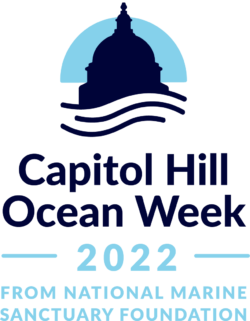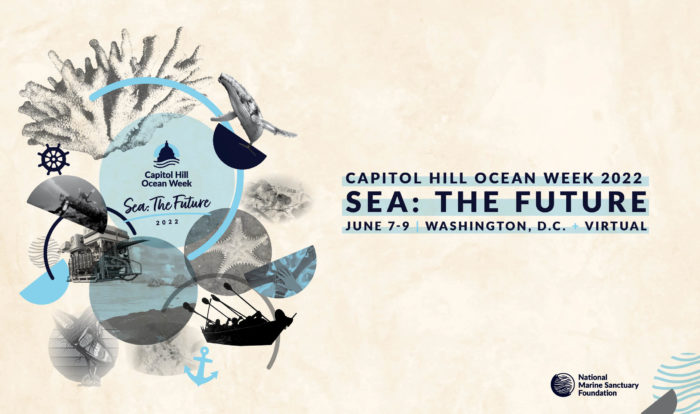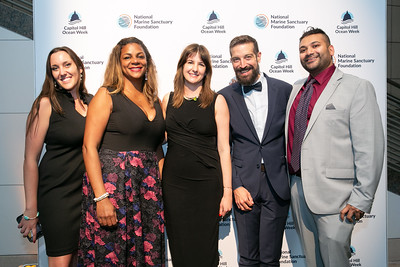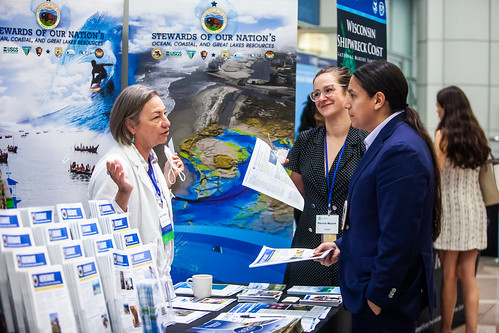Capitol Hill Ocean Week 2022

The National Marine Sanctuary Foundation returned in person, with a hybrid offering, for Capitol Hill Ocean Week on June 7-9, 2022. Sea: the Future celebrated the 50 years of progress achieved and to set a course for the new policies and actions necessary to transform our future
In 1972, the United States enacted a wave of legislation—the Marine Protection, Research and Sanctuaries Act, the Marine Mammal Protection Act, the Coastal Zone Management Act and amendments to the Clean Water Act—to sustain our ocean, coasts, and Great Lakes.
Today, 50 years later, we face new challenges. Climate change and biodiversity loss are fundamentally changing our ocean and Great Lakes. Coastal development increases pressures on ecosystems and communities. Multiple demands on resources and space lead to challenging policy and regulatory questions regarding how to best manage uses and sustain livelihoods. At the same time, coastal communities face a multitude of other issues, including migration and displacement, loss of culture, and ensuring equitable access to nature and resources.
These challenges all share a common solution: people.
We are grateful to our generous sponsors, partners, and all our participants. It is with your collaboration and support that Capitol Hill Ocean Week continues to be a success year after year.
For questions about the CHOW 2021 archive, or information about future CHOW events, contact conference@marinesanctuary.org.

Plenary Sessions- Day One
Opening Ceremony and Opening Plenary
Speakers: Frances Gulland (opening remarks), Kris Sarri (moderator), Ana Spalding, Steve Roady, Vidya Balasubramanyam
TED Talk Speakers: Michelle Bender, Nell Minow, Dr. Naomi Rose, Nikki Traylor-Knowles, Maya K. van Rossum
In 1972, the United States enacted a wave of legislation to protect our ocean, coasts, and Great Lakes. Fifty years later, we face new challenges as we work together to conserve our ocean and Great Lakes for future generations. This plenary session will explore how these Acts fundamentally changed how the United States manages marine, Great Lakes, and coastal environments and what needs to happen in the future.
Mar: El futuro
En 1972, los Estados Unidos promulgaron una serie de leyes para proteger a nuestro océano, costas y Grandes Lagos. Cincuenta años después, nos enfrentamos a nuevos desafíos mientras trabajamos juntos para conservar nuestro océano y Grandes Lagos para las generaciones futuras. Esta sesión plenaria explorará cómo estas Leyes cambiaron de manera fundamental la manera en que los Estados Unidos administra los ambientes marinos, costeros y de los Grandes Lagos y qué tiene que ocurrir en el futuro.
Speakers: The Honorable Jenniffer González Colón (opening remarks), Mike Scozzafava (moderator) Kirsten James, Marel King, Kelly McGinnis, Fred Tutman
TED Talk Speaker: Kelsey Leonard
Water quality is essential to healthy marine and freshwater ecosystems. Pollution-related stressors have a significant cumulative impact on the health of marine ecosystems. The plenary will highlight the importance of water quality and watershed management to sustaining our ocean, coasts and Great Lakes and protecting human health.
Pescar, nadar y beber: Por qué es importante el agua limpia
La calidad del agua es esencial para que existan ecosistemas marinos y de agua dulce saludables. Los factores de estrés tienen un importante impacto acumulativo sobre la salud de los ecosistemas marinos. Este plenario resaltará la importancia de la calidad del agua y de la administración de cuencas acuíferas para sustentar nuestro océano, costas y Grandes Lagos y para proteger la salud humana.
Speakers: The Honorable Senator Lisa Murkowski (opening remarks), John Serafini (opening remarks), Dr. Paul Doremus (moderator), Dr. Dalee Sambo Dorough, Feini Yin, Imani Black, Dr. Michelle Tigchelaar,
We rely on our ocean and Great Lakes for food and culture. This plenary will explore how we manage food from the salt and freshwater seas and what role they play in global and national food security and protecting cultures in the future.
Alimento del mar
Dependemos de nuestro océano y Grandes Lagos para obtener comida y sostener nuestra cultura. Este plenario explorará cómo administramos el alimento que proviene de mares de agua dulce y salada y qué papel juegan en la seguridad global y nacional y en la protección de culturas en el futuro.
Speakers: The Honorable Alan Lowenthal (opening remarks), The Honorable Derek Kilmer (opening remarks), Daniel Bresette (moderator), Eddie Ahn, Ellen Crivella, Dr. Emily Shumchenia, Josh Kaplowitz, Michael Snyder
The U.S. set an ambitious goal of a net-zero emissions economy by 2050. To achieve this goal, the U.S. will need to substantially grow renewable energy. How do we grow blue energy to power communities, protect our ocean and Great Lakes, and manage multiple uses?
Viento, agua y olas: Energía renovable marina
Los EE.UU. establecieron una ambiciosa meta de lograr una economía de cero emisiones netas para el 2050. Para lograr esta meta, los EE.UU. tendrán que aumentar de manera sustancial su producción de energía sustentable. ¿Cómo aumentamos la producción de energía azul para dar energía a las comunidades, proteger nuestro océano y Grandes Lagos y administrar múltiples usos?
Plenary Sessions - Day Two
Speakers: The Honorable Kaialiʻi Kahele (opening remarks), The Honorable Suzanne Bonamici (opening remarks), Dr. Alan Leonardi (moderator), Dr. Carlie Wiener, Larry Mayer, Dr. Lea Shanley, Dr. Samantha Chisholm Hatfield, and Dr. Tiara Moore
Roughly 80 percent of the ocean is unmapped, unobserved, and unexplored. Only an estimated 10–25 percent of marine species have been described globally. Baseline data and long-term monitoring are necessary to track the status of both species and habitats. This plenary will focus on how Indigenous knowledge and wisdom, community science and technology can expand our understanding of the ocean in the face of climate change.
Expandir la comprensión acerca del océano
Alrededor del 80 por ciento del océano continúa sin estar mapeado y sin ser observado ni explorado. Se estima que solo entre el 10 y el 25 por ciento de las especies marinas han sido descritas a nivel global. Se necesitan datos de referencia y monitoreo a largo plazo para realizar un seguimiento del estado tanto de las especies como de los hábitats. Este plenario se enfocará en cómo el conocimiento y sabiduría indígena, la ciencia comunidad y la tecnología pueden expandir nuestra comprensión del océano frente al cambio climático.
Speakers: Karen Sack (moderator), Dr. Eli Feniche, Monica Medina, Raphaël Goulet, Xiao Recio-Blanco
Industrial activity in the ocean is growing rapidly. The ocean represents one of the planet’s largest and last areas for expansion to support economic growth – as a source of food, material, and space. How do we plan for economic growth while protecting habitats and species critical for a thriving ocean? How do we value ocean resources and measure sustainable development?
La Revolución Industrial subacuática
La actividad industrial en los océanos está creciendo rápidamente. El océano representa una de las mayores y últimas áreas de expansión para apoyar el crecimiento económico, como fuente de alimento, material y espacio.
Speakers: The Honorable Jared Huffman (opening remarks), Sean Cosgrove (opening remarks), Jenny de la Hoz, Dr. Kirsten Grorud-Colvert, Naiʻa Lewis, Rick Spinrad, Dr. Sarah Gignoux-Wolfsohn, Shannon Estenoz
America the Beautiful strives to voluntarily conserve at least 30 percent of US lands and waters by 2030. This plenary will explore the actions the U.S. needs to take locally and globally to protect biodiversity protection and how to measure progress.
Aguas salvajes
El fondo ‘America the Beautiful’ se esfuerza por conservar de manera voluntaria al menos el 30 por ciento de las tierras y aguas de los EE.UU. para el 2030. Este plenario explorará las acciones que los EE.UU. deben tomar local y globalmente para proteger la biodiversidad para proteger la biodiversidad y cómo medir el progreso.
Speakers: Nathan J. Bennett, Ph.D., Queen Quet, Sophia Kianni, Nisreen Elsaim, Cheryl Andrews-Maltais
Climate change and sustainable development are a common concern to humankind. The Paris Agreement, the UN Sustainable Development Goals, and the Convention on Biological Diversity recognize that the rights of Indigenous peoples and local communities should be respected, promoted and considered in policy agreements. This plenary focused on how these international mandates and discussions can better provide a key platform for building access and power into policy-making. Panelists emphasized the importance of recognizing and ensuring strong representation of indigenous people and local communities in international and national policy discussions, that organizations and governments working in the ocean space must account for the voices, rights and needs of indigenous people and local communities in their deliberations, and that financial support ought to be provided local communities to ensure their involvement is possible, among other conclusions.
Virtual Breakout Sessions Day 1
- Conservation Beyond Our Walls - Aquariums of the Future
- A Long Term Vision for National Marine Sanctuaries
- Sea the Future: How the Ocean Decade can Empower the Next Generation of Ocean Ambassadors
- Bringing You Into the Waves: Tu Mar, Nuestro Canto
- Winds of Change: State Perspectives on Building a Sustainable Offshore Wind Industry
- Tools in the Ocean's Toolbox: Unlocking Ocean Information for Sustainability
- Advancing Ocean Justice: Community Centered and Locally Led Solutions
Speakers: Brynn Heller, Dr. Dayne Buddo, Jennifer Driban, Kim McIntrye, Noah Chesnin, Dr. Erin Meyer, Sarah Reiter
Hosted by: Aquarium Conservation Partnership
Aquariums are fun places to visit, but did you know they are also actively engaged in conservation beyond their walls? In this session, representatives from leading aquariums around the United States will discuss how they are influencing the conversation around science, policy and operations to impact communities and ecosystems.
Speakers: Nicole R. LeBoeuf(moderator), Dr. Jan Newton, Jay Haigler, Dr. Larry McKinney, Sol Kaho’ohalahala,
Hosted by: NOAA Office of National Marine Sanctuaries
This panel will look at priorities outlined in the National Marine Sanctuaries Act (conservation, public engagement and science and research) We will to discuss how those goals can be met while expanding indigenous, cultural, and tribal significance; diversity, inclusion, and accessibility; meeting and mitigating the effects of climate change; and infrastructure requirements.
Virtual Breakout Sessions Day 2
Speakers: Brian Davis, Daniela Fernandez, Dr. Letise LaFeir, Shiv Goel
Hosted by: NOAA Office of Oceanic and Atmospheric Research
The United Nations Decade of Ocean Science for Sustainable Development presents a once in a lifetime opportunity to achieve “the ocean we want” by conducting the “science we need” over the next ten years. Building on the theme of Capitol Hill Ocean Week’s “Sea the Future”, this panel proposes showcasing the voices of diverse early career scientists, advocates, and entrepreneurs of the Ocean Decade. The panelists will discuss how the Ocean Decade can empower the next generation of ocean ambassadors and their vision for the future of the Decade, into 2030 and beyond.
The session featured a film and was not recorded. Please contact the Hispanic Access Foundation for information regarding this session.
Speakers: Isabella Briseño, Andrianna Dowell, David Riera, Ashley Suarez-Burgos, Claudia Pineda Tibbs
Hosted by: Hispanic Access Foundation
Activism in action: film screening & discussion. Hispanic Access Foundation’s Ocean Advisory Council is proud to present Hecho de Agua, a film about Latino relationships to our ocean. Enjoy an open discussion where panelists will bring you, the participant, into the waves – and into the discussion about your connections to the water and what you see on the horizon for elmejoramiento de nuestrasmañanas (a better tomorrow). This will not be your ordinary panel discussion!
Speakers: Ava Ibanez (moderator), Chris Lee, Liz Lovelett, David Walters
Hosted by: National Caucus of Environmental Legislators
Join NCEL to learn from a panel of state legislators about offshore wind policy at the state level. State legislators will talk about the status of the industry in their states and the importance of having a comprehensive policy framework to support the development of offshore wind. The panel will address the importance of collaboration with stakeholders, other states, and the federal government to ensure that the industry is community-driven, sustainable, and equitable.
Speaker: Nicole LeBoeuf (moderator), Dr. Emily Shumchenia, Dr. Jake Kritzer, Dr. James Morris, Dr. Veronica Lance,
Hosted by: NOAA National Ocean Service
As we look to build a sustainable future for our oceans, it is more important than ever to understand the complexities of marine ecosystems. Join Nicole LeBoeuf, National Ocean Service Assistant Administrator, as she moderates a panel of experts who are harnessing the power of oceanic information in order to better manage and conserve our oceans and coasts. Panelists will share insights on the ever-growing importance of oceanic data and observations and how transforming these data into ocean intelligence and decision-support tools can reduce the risk of negative impacts and increase protections to all ocean resources.
Speakers: Dr. Francisco Ollervides (moderator), Adriana Guerrero, Claudia Pineda Tibbs, David Riera, Mariana Del Valle Prieto Cerva, Queen Quet, Rai Espinoza, Trisha Kehaulani Watson
Hosted by: Ocean Conservancy
Description for the session: Ocean justice is the fair and equitable distribution of both the benefits of the ocean bounty and the burdens of its complex care. Moderated discussion in which Ocean Justice Advisory Group members will share their equity and justice insights to advance community centered and locally led solutions that address coastal community resilience.
Virtual Breakout Sessions Day 2
- Strengthening Protections for our National Marine Sanctuaries
- The Future of Ocean-Based CDR Research
- Go Slow, Whales Below: Slow Speeds Save Whales Virtual Breakout
- Tools and Technology for Climate Resilient Fisheries
- Stewards of the Land and Water
- The Marine Mammal Protection Act: The Next 50 Years
- Philanthropic Perspectives-Advancing Diversity, Equity, Inclusion & Justice in Marine Conservation
- Meet the NOAA Administrator's Political Team
Speakers: Dr. Francine Kershaw, Les Kaufman, Dr. Priscilla Brooks, Sarah Barmeyer, Sarah Chasis,
Hosted by: Natural Resources Defense Council, Conservation Law Foundation, and Environment America
During this session we will discuss how strengthening protections for our National Marine Sanctuaries is crucial in fulfilling the national commitment to 30X30 and America the Beautiful.
To access the PowerPoint: Click Here
Speakers: Elizabeth Whiteman, Kelly Oskvig, Matthew Eisaman, Scott Doney, Simon Freeman, Romany WebbHosted by: ClimateWorks
A future ocean to help mitigate climate change? A 2020 National Academies’ study outlines the research needed to better understand the viability of scale-up of a variety of ocean-based carbon dioxide removal approaches – some of which could potentially play a role in enhancing the ocean’s natural ability to absorb anthropogenic carbon dioxide and help to meet global climate goals. This session is designed to keep the conversation moving forward on next steps for establishing the legal and political foundational framework needed to implement ocean-based CDR research, specifically exploring: (1) new approaches to incentivizing CDR research and possible deployment and (2) reforms needed to ensure R&D occur safely and responsibly.
Speakers: Brian Sharp, Dr. David Wiley, Moira Brown, Kathleen Collins, Shauna Fry
Hosted by: International Fund for Animal Welfare
At any given moment, there are approximately 50,000 merchant ships crisscrossing our global waterways, carrying as many as 5 to 6 million containers stuffed with goods. With global trade increasing, ships are getting bigger, and shipping routes are getting more crowded. In addition to commercial shipping, in the US alone we have at least/more than/approximately 12 million recreational boating vessels as of 2020. Our waterways are becoming increasingly congested, with high traffic areas often intersecting with critical habitats of marine mammals along the US and Canadian coasts.
One of the leading causes of death for marine mammals is vessel strikes. Vessel strikes by small boats under 65 feet are of particular concern to mammals such as the critically endangered North Atlantic right whale, who swim through congested shipping lanes and recreational boating areas as part of its annual migration. Vessel strikes can cause serious damage to the vessel as well, putting those onboard at risk. Join our breakout session to hear from US and Canadian scientists, educators, and advocates about the importance of mandatory speed restrictions, and how citizen science and the free Whale Alert app are helping reduce the risk of deadly vessel strikes to whales.
Speakers: Evan Howell, Matthew Campbell, Melissa Karp, Dr. Michael Liddell, Mike Lewis
Hosted by: NOAA Fisheries
Speakers: Katie Cubina (moderator), Ayana Melvan, Candyce Testa, Samantha Cullen-Fry, Silvermoon Mars Larose, Dr. Tracy Romano,
Hosted by: Mystic Aquarium
The establishment of authentic partnerships between Aquariums and Indigenous communities can be a powerful lesson in listening and learning. When we put science and traditional ecological knowledge on the same playing field and embrace a shared vision to restore and conserve our lands and waters, a new pathway emerges that empowers locally led conservation that can contribute to 30×30. Join Aquarium staff and representatives of the Mashantucket Pequot Tribal Nation and the Narragansett Tribe in a discussion of our shared work from waterways in New England to beluga whales in the high Arctic.
Speakers: Don Baur, Dr. Francine Kershaw, Dr. Naomi Rose, Dr. Tim Ragen
Hosted by: MMPA Coalition
For 50 years, the Marine Mammal Protection Act (MMPA) has served as the nation’s leading statute for the conservation of these ecologically and culturally important species. To mark the milestone, this expert panel will consider the MMPA in the context of a rapidly changing ocean. What policies are needed to conserve marine mammals amid a future of ocean warming and increasing industrial use of the sea?
Speakers: Melvin Alverez, Nina Lagpacan, Mary Turnipseed
Speakers: Adena Leibman, Lori Arguelles, Perry Brody, Dr. Letise LaFeir, Makeda Okolo, Miro Korenha, Shalini Mohleji
Hosted by: NOAA
During this session we will discuss how strengthening protections for our National Marine Sanctuaries is crucial in fulfilling the national commitment to 30X30 and America the Beautiful.




